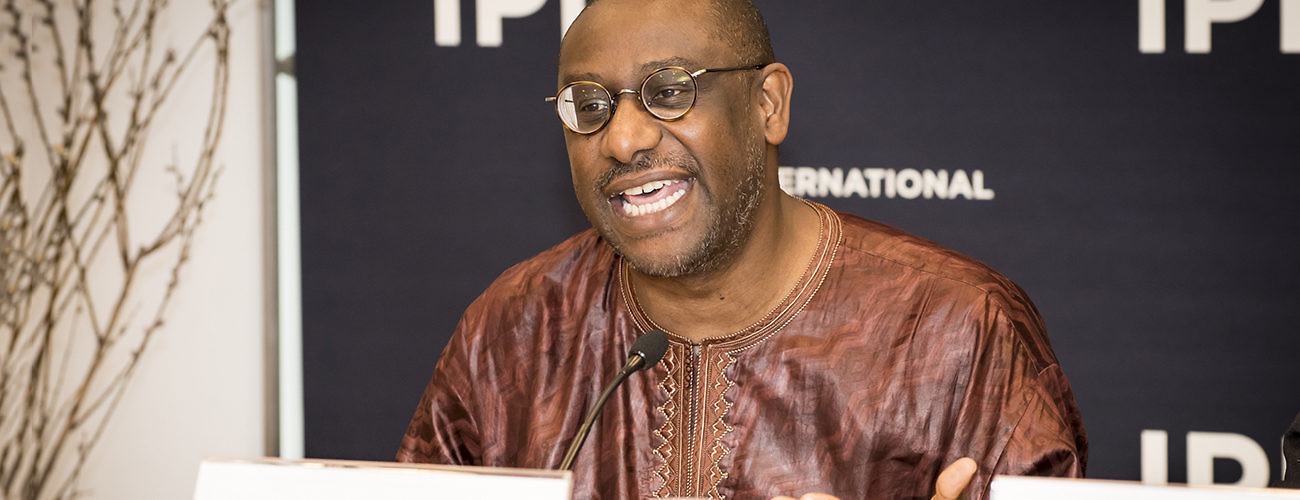Thabo Mbeki, a former President of South Africa who remains active in foreign policy, has been hailed as the most important African political figure of his generation. Adekeye Adebajo, editor of a new book on the politician, said the pan-African philosopher’s legacy will be “African identity.”
Mbeki set out a sweeping vision of an African renaissance as president of Africa’s most industrialized state, Mr. Adebajo said. This vision could inspire “a grassroots movement to implement his ideas” today, Mr. Adebajo told the IPI audience at the launch of his new book, Thabo Mbeki: The Rise and Fall of Africa’s Philosopher-King on May 19, 2016.
The book argues that Mbeki’s impact goes beyond the domestic politics of South Africa, and places him in history as a pan-African pantheon. His foreign policy achievements as president had significant impact in building continental institutions such as the African Union (AU) and the New Partnership for Africa’s Development (NEPAD), Mr. Adebajo said.
Mr. Adebajo, Executive Director of the Centre for Conflict Resolution in Cape Town, contrasted Mbeki’s philosophy with that of the key figure of South Africa’s transformation, Nelson Mandela. Mbeki spent two decades as a liberation leader in exile. His advocacy, including secret negotiations with white interest groups, was central to the African National Congress (ANC)’s anti-apartheid struggle.
During the South African transition, he helped build one of the world’s most respected constitutional democracies, Mr. Adebajo said. “He ran the country as de facto Prime Minister, even under Mandela,” Mr. Adebajo said.
Mandela may have preferred language around reconciliation, Mr. Adebajo said, but Mbeki was “justified in putting race at the center of debate on transformation in South Africa.”
“Mbeki is a complex figure, full of contradictions and paradoxes,” Mr. Adebajo said. Some of these dichotomies include being a public intellectual who worried disproportionately about his critics, being raised in a rural environment but ultimately becoming an urban sophisticate—a “black Englishman in a tweed jacket,” he said. A committed Marxist, Mr. Adebajo later protected white corporate interests.
Princeton Mr. Lyman joined the book launch as a discussant, drawing on his experience as Ambassador to South Africa in the historic years of transition to democracy from 1992-1995, during which time he got to know Deputy President Mbeki first hand. Mbeki “implemented much of Mandela’s legacy—it was not Mandela’s thing to be a day-to-day manager,” he said.
Mr. Lyman, now Senior Adviser at the United States Institute of Peace (USIP), said Mbeki embraced democracy and all its challenges. He hoped to overcome the country’s colonial legacy, and create something uniquely African. The “last thing he wants is for outsiders to dictate norms,” he said.
When Mbeki became president, despite some successes, he was unable to overcome South Africa’s inherited socio-economic challenges, Mr. Lyman said, and his disastrous AIDS policies will remain a major blot on his legacy.
Mbeki rejected the scientific consensus that AIDS was a viral infection whose impact could be reduced, though not cured, through expensive medical drugs. “For all his faults, his HIV/AIDS policies were a terrible digression, Mr. Lyman said. “He couldn’t balance his gut feeling and intellectual capacity to see [his version of] reality was skewed. He asked the right questions but got to the wrong answers.”
Influenced by AIDS-denying scientists, Mbeki asserted that poverty and malnourishment were the virus’ causes, and therefore the only cure could be the alleviation of poverty in Africa.
Mr. Lyman said Mbeki’s “reluctance to be hooked on foreign drugs,” led him to reject offers of free drugs and grants, and his government’s treatment programs instead promoted the use of unproven herbal remedies. Harvard researchers estimate 330,000 preventable deaths resulted from Mbeki’s policies.
Mr. Lyman described Mbeki as a man who “devoted his life” to his political party, the ANC. Despite this, his 2008 resignation was precipitated by the ANC Executive Committee’s decision to no longer support him in parliament. “His own party should not have forced him to give up presidency,” Mr. Lyman said, calling the decision “undeserved.”
Mr. Adebajo had earlier compared Mbeki to the British Prime Minister Margaret Thatcher because, like her, he was a stubborn leader who made harsh decisions based on a personal vision, and ultimately paid the price by becoming isolated from, and removed from office by, his own party.
Though out of office, Mbeki today remains a “very active” statesman, who “works on Sudan, chairs an AU study on illicit financing, and is not shy to comment on South Africa,” Mr. Lyman concluded.
The event was co-hosted by the Centre for Conflict Resolution (CCR) Cape Town, South Africa.
Ambassador John L. Hirsch, IPI Senior Adviser, moderated the discussion.
Related Coverage:
“A Psychological Analysis from a New Biography of former South African President Thabo Mbeki” (IAAP, May 26, 2016)








